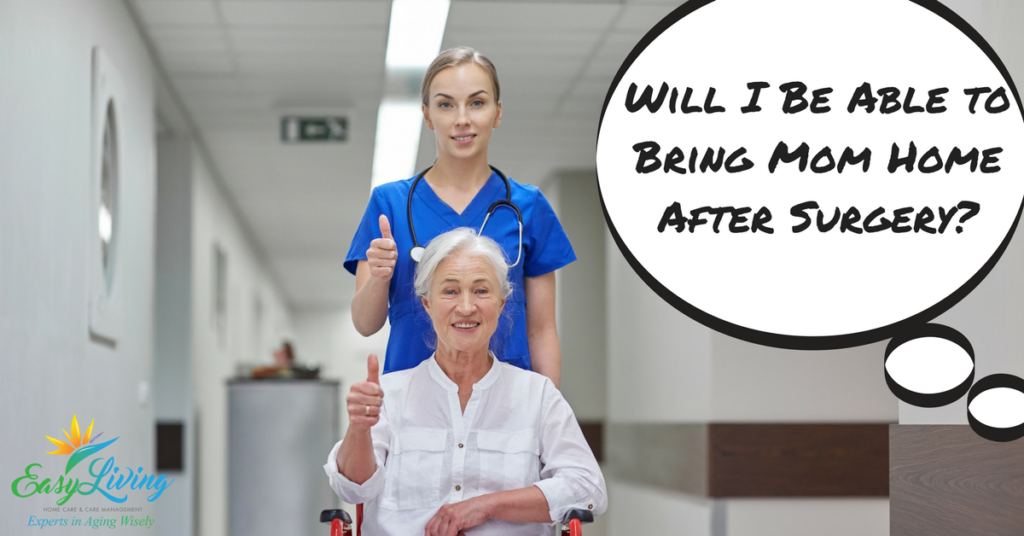This may be the burning question if your elderly parent is preparing for surgery. It seems simple…just ask the doctor, right? However, because they usually aren’t familiar with patients in their home environments, doctors may be unaware of various factors. Therefore, the answer may be based on certain assumptions about aftercare needs and the level of support you can provide. And, you may end up woefully unprepared to deal with those needs.
With our many years helping families, our team has seen just how important it is to realistically approach this situation. We’ll explain how to ask the questions you really need answers to and factors to consider. And, we’ll offer resources that will help you bring Mom home safely.
Asking the Right Questions about Bringing Mom Home After Surgery
These important questions will help you get a clear picture of what Mom will need after surgery. Almost anyone can go home after surgery with the right services, support and equipment. But, that requires some preparation.
Our post-surgery checklist outlines the key questions to ask. You can talk to the doctor/nurse about many of these in the weeks preparing for surgery. That way you know what to anticipate and aren’t scrambling to set up services at the last minute. Better yet, get help from an expert care manager.
Click Here to Download our Post-Surgery Checklist
Considerations
The “danger zone”: understand the immediate post-surgery needs
The first 24-48 hours presents the greatest time of concern. This is when patients feel worst. Mom may be groggy and experiencing side effects of anesthesia and medications. In addition to general surgery recovery, the patient usually needs a lot of support during this time. Mom will likely be weak and may sleep a lot. But, she could also need help with basic tasks like getting to the bathroom. It’s easy for a patient to fall and get injured shortly after coming home.
The not so little things: transportation & logistics
How will you get Mom home from the hospital? Can you get her in and out of the car? Does she need new medications and when/where will you get them? Does Mom have follow up appointments? And, do you know when they are and how she’ll get to them? Will someone be delivering equipment or providing aftercare? Do you know when that will happen and have the contact info.?
Setting up all the details makes all the difference. You’ll be focused on Mom’s immediate needs, so the last thing you need is headaches over logistics. Check out Linda’s Story and “Don’t let surgery lay you up” tips for more about logistics and preparing.
Are you equipped?
Will you need to go shopping or have you stocked up on needed food and supplies? What might Mom need that you should have on hand (OTC meds, food, drinks, heating pad, bandages…)? Running out to the store can be difficult when Mom needs your help.
Do you need special medical equipment? If so, when and how will you get it? For example, if Mom needs a walker or cane to get around you don’t want to be waiting on a company to deliver it two days later. Many patients need raised toilet seats, shower chairs and other assistive devices while recuperating. Depending on the type of surgery, Mom may need a wifi scale or other home monitoring equipment to track progress and problems.
Is the home safe? “Fall proofed” and free of clutter? Set up with grab bars and minimal barriers? Grab a copy of our room-by-room safety evaluation to get an idea of what might be missing.
A care manager can do a pre-surgery home assessment to create a checklist of needs. He/she can also carry out the arrangements to make sure everything’s been set up before Mom arrives home.
Resources
Skilled home healthcare: nursing, PT, OT
Ask your doctor about skilled home health care. This might include a nurse to check vital signs or change a dressing. Physical and occupational therapists can also provide therapy in the home. Additionally, while the home health company is providing skilled services they can offer supportive services such as a home health aide to assist with a bath.
This is where understanding your needs and communicating them to your medical providers comes in handy. Mom’s doctor may assume she can come to an outpatient clinic for therapy or treatments. If he understands the difficulties this may present, Mom should be able to get the services she needs.
Home health aide/household support
Whether or not Mom gets skilled home health, a home caregiver could be immensely helpful. If Mom is getting skilled services, you might still wish to seek additional help through a home care company. They can coordinate with the skilled care to provide complementary services.
A home caregiver can assist with personal care like bathing, dressing, and getting Mom to the toilet. But, they can also help with meal preparation and other tasks around the home. This support greatly increases Mom’s chances of a healthy, safe recovery. And, it certainly provides relief to you as the caregiver.
Care manager/patient advocate
One of the best ways to ensure good outcomes after surgery is with an independent advocate. Care managers have extensive experience navigating the healthcare system. They know what to ask and how to get things done. This saves you lots of time, and even more stress. A care manager can help you locate the best providers, prepare for the surgery, set up services and more. Often, it’s the little issues they anticipate that make a huge difference for you and Mom.
Preparing for surgery or dealing with health or eldercare issues?
Discuss your situation, concerns and possible solutions with one of our experts.







